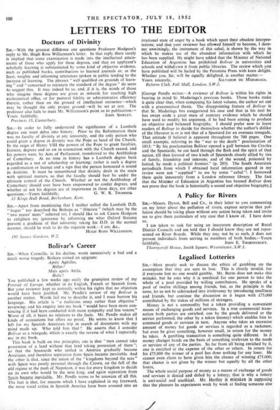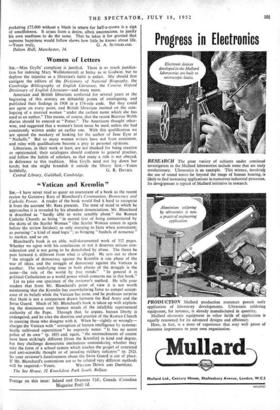Legalised Lotteries
SIR,—Most people seek to discuss the ethics of gambling on the assumption that they are sure to lose. This is clearly invalid, for if everyone lost no one would gamble. Mr. Burns does not make this mistake, but he asks why it is unethical for one person to take the whole of a pool provided by willing contributors. He speaks of a pool of twelve shillings among friends, but, as the principle is the same, let us not be sidetracked into irrelevancy by introducing smallness and friends, but continue the discussion as it began with 05,000 contributed by the stakes of millions of strangers.
. Money is not a commodity but a token providing a convenient means of exchanging goods and services. In a true commercial trans- action both parties are enriched, one by the goods delivered or the service performed, the other by a token (money) which enables him to command goods or services in turn. Anyone who takes an excessive amount of money for goods or services is regarded as a racketeer, but even he gives something, however small, in return for the money he takes. A gambling transaction is something quite different. In it money changes hands on the basis of something irrelevant to the needs or services of any of the parties. So far from all being enriched by it, one is enriched at the expense of ,the other or others. In return for his £75,000 the winner of a pool as done nothing for any loser. He cannot even claim to have given him the chance of winning £75,000; that chance is not given by the winner but equally by all the other losers, The whole social purpose of money as a means of exchange of goods and services is denied and defied by a lottery; that is why a lottery is anti-social and unethical. Mr. Hartley is mistaken in supposing that the pleasure he experiences week by week at finding someone else
pocketing £75,000 without a blush in return for half-a-crown is a sign of unselfishness. It arises from a desire, albeit unconscious, to justify his own readiness to do the same. That be takes it for granted that supreme happiness would follow shows bow little. he knows about life.



































 Previous page
Previous page